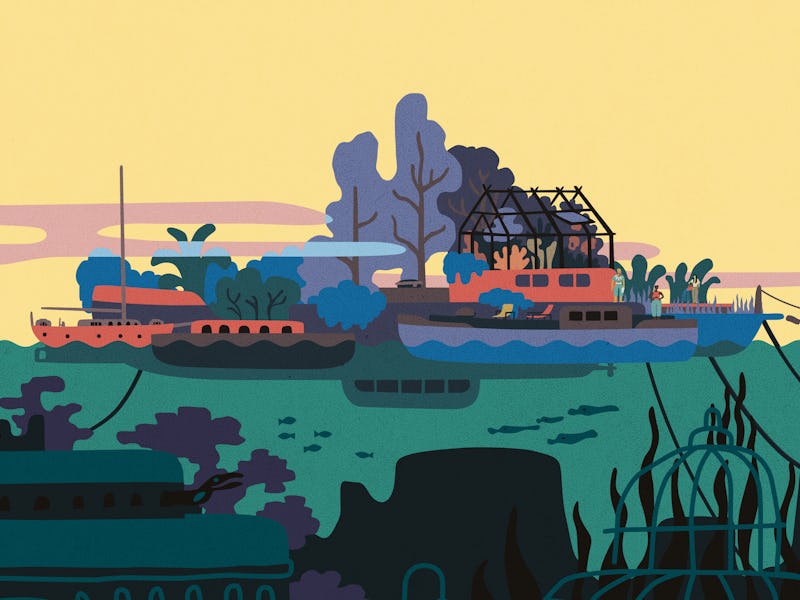One of 2023’s Best New Indies Defies a Classic Video Game Rule
Saltsea Chronicles is a ship without a captain, and it’s better off for it.

It makes sense that most video games cast you as the story’s hero. You’re going to spend a lot of time as one character, so why not make it the most important person in that particular universe? Even in games like Mass Effect where there’s a central crew of adventurers instead of one lone savior, you’re still the leader of the pack.
Saltsea Chronicles is different. Instead of honing in on a hero, it explores what happens in the vacuum of one, and how the supporting cast of an adventure can rise to the occasion. In the process, the game tells a powerful story about collective action that feels perfectly tailored to our current times — even if the story takes place in a post-apocalypse.
Each member of De Kelpie’s crew gets their time in the spotlight.
Set after society recovers from catastrophic floods caused by an earlier, resource-devouring civilization, the game from independent Danish developer collective Die Gute Fabrik (Sportsfriends, Mutazione) follows a crew of explorers on their ship, the De Kelpie. The society that’s sprung up in its archipelago setting is altogether more gregarious than ours, with an emphasis on communal property and mediation rather than hoarding and conflict.
As Saltsea Chronicles begins, De Kelpie’s captain Maja disappears into the night, leading her companions on a voyage across the known world to track her down. It would be the perfect setup for a swashbuckling member of the crew to step up and find themselves promoted to main character status. But that’s the opposite of what happens here.
With no one at the helm, the crew sets out across the open sea, stopping at port after port to find evidence of their captain’s whereabouts, where they gather hints of a slowly unfolding plot she’s embroiled in. At each stop, one character will take the lead, and you’ll choose who should accompany them.
Even though one character is guaranteed to be on the landing party at each port of call, they’re not treated as any more of a protagonist. Who you choose to bring affects what happens on each island, and sometimes they’ll play an even larger role than the character who’s ostensibly in charge.
That setup still wouldn’t be out of place in a party-based game like Dragon Age. But where most games would choose to emphasize character skills in your decisions, encouraging you to pick whoever is the most useful, Saltsea Chronicles instead focuses on their desires and connections to other people. No matter who you take, you’ll inevitably advance the story with each stop, bringing you one step closer to your missing captain. What your choice changes is the conversations and relationships with other characters. Choosing a companion with a crush on the expedition leader will lead to very different outcomes than taking someone who’s feuding with them, even if the overall plot remains the same.
The islands of Saltsea Chronicles burst with life.
Each island you visit in Saltsea Chronicles represents one chapter. At the end of a chapter, you choose where to go next, but the game also creates a checkpoint. At any time, you can revisit a chapter you’ve already played and choose a different crewmate to accompany you. Letting you revisit the past and play fundamentally different versions of the same story further reinforces the hero-less narrative of Saltsea Chronicles. When you can replay the same story beats with a different cast and both are equally satisfying, it’s hard to see one character as more important than any other.
Like any ragtag video game party, De Kelpie’s crew doesn’t always see eye to eye, but here there are no quests to tidily resolve squabbles or wash away past trauma. In conversations, you can choose some dialogue options, often switching between both participants. While that gives you some control over how tensions resolve, things don’t always play out as you might expect. Navigating fractured relationships and simmering tensions is just as often an exercise in patience as it is picking the right things to say.
Every expedition is a chance for your crew members to grow.
With its constantly shifting spotlight, Saltsea Chronicles says that no one’s needs are more important than another’s. Each member of De Kelpie has the capacity to love and grieve, to make mistakes, and to lift each other up. As I led the crew on their island-hopping voyage, I found my sympathies shifting just as my perspective on events did.
The crew is exceptionally skilled at navigating their differences, but that doesn’t mean they always agree. Rather than presenting a utopian world where people avoid the friction of conflict altogether, Saltsea Chronicles shows an even more hopeful vision. It’s a world where feelings get hurt and people act selfishly, but where the common good prevails more often than not and fractures strengthen relationships rather than shatter them.
In Saltsea Chronicles, it takes more than a hero to solve the world’s problems — it takes a community. Despite the far-flung future setting, Saltsea Chronicles feels like a game of the moment. Its depiction of climate change may be bleak, but in its call for collective interest over individualistic greed, its drowned world feels deeply hopeful.